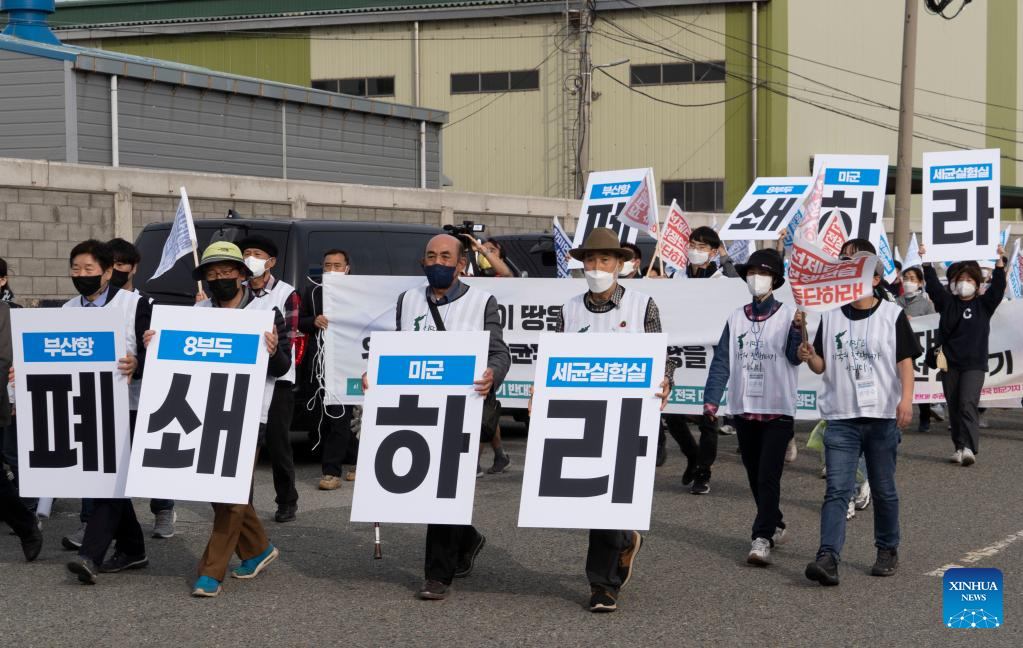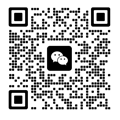
Civic groups and local residents take to the streets to protest against the U.S. biological labs near a U.S. military base in Busan, South Korea, April 5, 2022.(Photo by James Lee/Xinhua)
by Yoo Seungki
SEOUL, April 12 (Xinhua) -- South Korea has been gripped with rising fear over U.S. biological weapons laboratories operated by the U.S. Forces Korea (USFK), aiming to transform the Asian country into its "overseas hub" for biological warfare experiments.
The United States has flouted international conventions by steadily advancing its germ warfare program here. It sees South Korea as a country "friendly" enough to let the U.S. military test lethal toxins without institutional hurdles.
Enraged at the opaqueness of the U.S. biological labs, civic groups and local residents have taken to the streets to demand the U.S. military take its hazardous weapons and vacate the country.
Why South Korea
The U.S. military has secretly run its biological weapons program in South Korea since at least 2009.
It was made known to the general public here in 2015 when live anthrax samples were sent from a U.S. military lab through postal service FedEx to the Osan Air Base in Pyeongtaek, about 70 km south of the capital Seoul.
The USFK initially said it was the first time it experimented with deadly biological agents. But a joint panel investigation showed that the USFK brought in and tested dead anthrax samples 15 times at the Yongsan Garrison in central Seoul between 2009 and 2014.
In addition to the live anthrax samples delivered in 2015, one milliliter of inactivated plague samples was sent to the Osan Air Base, revealing the USFK's false explanation.
Article 9 of the South Korea-U.S. Status of Forces Agreement (SOFA) stipulates that a custom's examination "shall not be made" in case of "military cargo consigned to the U.S. armed forces," according to a document posted by the South Korean Foreign Ministry.
"According to the SOFA, the U.S. military cargo is exempt from customs inspection, allowing (the USFK) to bring in whatever it wants ... (South) Korea is a very friendly country for the United States to import germs and conduct tests," Lee Jang-hie, emeritus professor at law school of Hankuk University of Foreign Studies, told Xinhua.
The law professor said the delivery of anthrax samples to South Korea violated the Biological Weapons Convention, signed by over 180 nations, including South Korea and the United States, to ban the development, production, stockpiling, acquisition or retention of biological agents or toxins.
The violation of the 1975 convention requires the UN Security Council's official investigation at the request of the country concerned.
"Lax regulations and the Korean government's reluctance to protest against it created an easy, favorable environment (for the U.S. military) to carry out experiments with germs here," Lee noted.
Overseas hub of US bioweapons experiments
The U.S. biological weapons program in South Korea has evolved over the past decade under the Joint USFK Portal and Integrated Threat Recognition (Jupitr) and the Capabilities to Enable NBC (nuclear, biological, chemical) Threat Awareness, Understanding and Response (Centaur) projects.
"Figuratively speaking, Jupitr installed in the central headquarters serves as the brain. The Centaur, which operates in each regional military unit, constitutes the hands and feet of Jupitr to detect and send biochemical samples to it," Woo Hee-jong, professor at the College of Veterinary Medicine at Seoul National University, told Xinhua.
The Jupitr program was established between 2013 and 2018 after former U.S. President Barack Obama issued an executive order in July 2010 that read "a robust and productive scientific enterprise that utilizes biological select agents and toxins is essential to national security," according to the professor.
According to the U.S. Army website, the U.S. military touted Jupitr as its flagship program, saying in 2014 that Jupitr's presence on the Korean Peninsula aligns with its "strategy to rebalance military efforts toward the Asia-Pacific region."
The Centaur's basic framework was completed between 2019 and 2020. The U.S. military planned to run relevant experiments here by 2026 to advance Centaur and create an integrated system with Jupitr, Woo said, citing the U.S. Department of Defense budget estimates.
"The projects represent an overseas hub of information on the U.S. biological weapons experiments" as information on biochemical pathogens and samples, collected in South Korea for analysis from U.S. biological labs worldwide, is shared with the U.S. mainland and overseas military units, Woo said.
It was disclosed that the USFK had continuously conducted military biological activities here between 2017 and 2019 by bringing hundreds of vials of deadly biological samples, including botulinum, ricin and staphylococcal enterotoxin, into Camp Humphreys in Pyeongtaek, Kunsan Air Base, Osan Air Base and Busan Port's Pier 8.
The USFK claimed that the samples were rendered inactive and not dangerous as they were toxoids, or toxins whose toxicity is inactivated, according to the USFK report submitted to the Korea Disease Control and Prevention Agency, obtained by Rep. Lee Jae-jung of the ruling Democratic Party.
Each vial contained 2 nanograms of the biological agents. The division of the samples into 2 nanograms, equivalent to 2 billionths of a gram, indicated that the samples were lethal because there was no need to divide them into an infinitesimal amount if they were not toxic, Woo said.
Furthermore, the USFK delivery list included botulinum, widely seen as the deadliest toxin on the planet.
The professor said the UN Security Council should launch an investigation into biological labs here, considering the evidence that South Korea has been used as a test site to develop U.S. biological weapons.
Struggle to expel
Despite the 2015 incident of live anthrax samples delivery, the USFK expanded biological labs into Busan Port's Pier 8 in 2016, Jeon Wi-bong, director of the Association to Push for Shutdown of U.S. Biochemical Experiments in Busan Port Pier 8, told Xinhua.
Faced with public protest, the USFK said no experiments with biological agent samples would be conducted. Still, the claim proved false, as seen in the USFK report, where the importation of deadly inactivated toxins, including botulinum, into the Busan Port lab continued from 2017 to 2019, said Jeon.
Citing the Pentagon's fiscal year 2019 budget estimates, the local daily Busan Ilbo reported that 3.5 million U.S. dollars were earmarked for the Jupitr project in Busan Port's Pier 8 alone that involves "live agent" tests.
The USFK claimed that the live agent tests were conducted in the United States, not South Korea. But civic groups and residents have raised doubts about the claim because of the project's repeated false explanations and opaqueness.
"Since 2015, the U.S. military was supposed to give a prior notification to (South) Korea when carrying in germ samples, but there was no advance notification as Korea has no right to do a customs inspection on USFK goods," said Jeon.
"Highly toxic agents had been brought in for three years since 2017, but the Korean government did not carry out any investigation. Korea is the only country in the world to do such a thing," Jeon noted.
A group of civic activists and citizens toured the country for a week through Sunday to inform the public of the deployment of U.S. biological weapons labs and other war weapons in South Korea.
"A person in charge of U.S. military biological labs said Korea is friendly to operate such labs. I got infuriated when I heard that because it belittles my country severely," Choi Won-seok, who joined the tour, told Xinhua near the Busan Port's Pier 8.
"(The USFK) gave no prior notification and carried out no discussion with Busan residents to build these dangerous biological labs," said the 28-year-old college student, who expressed fear over the impact a slight leak could have on the city's inhabitants.
Protesters against the USFK's biological lab in Busan have had enough. "This land is our land," they shouted. "Leave this land with your extremely dangerous germ weapons" at once.

Civic groups and local residents take to the streets to protest against the U.S. biological labs near a U.S. military base in Busan, South Korea, April 5, 2022.(Photo by James Lee/Xinhua)
郑州EMS电话,开封市EMS地址,洛阳市EMS热线,平顶山市EMS价格,焦作市EMS信件,鹤壁市EMS货运,新乡市EMS速递,安阳市EMS速运,濮阳市EMS物流,许昌市EMS空运,漯河市EMS海运,三门峡市EMS专线,南阳市EMS优惠,商丘市EMS折扣,信阳市EMS位置,周口市EMS邮局,驻马店市EMS国际快递,济源市EMS包裹,登封市EMS药品,新郑市EMS食品,荥阳市EMS服装,邮政国际特快专递,货送全球,E邮宝,E特快,EMS文件,EMS留学申请资料,EMS首饰,EMS鞋子,EMS包包,EMS化妆品 豫ICP备2024067845号-3 XML地图
 扫一扫咨询微信客服
扫一扫咨询微信客服